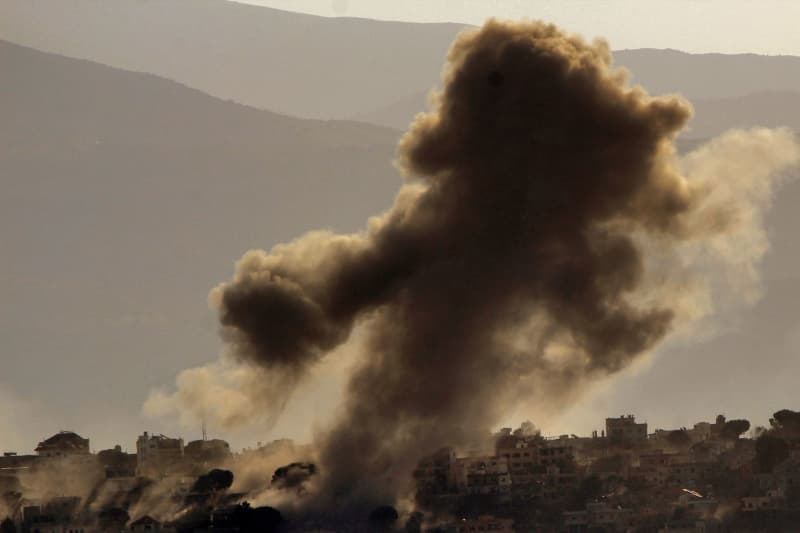On Thursday, an Israeli tank assault targeted the headquarters of the United Nations peacekeeping mission in southern Lebanon, injuring two members of the force, according to a UN statement. The incident specifically involved direct fire from an Israeli army tank that struck a UN observation post located in the coastal city of Naqoura. This event marks the first casualties among the UN peacekeepers since Israel’s incursion into Lebanon against the pro-Iranian Hezbollah militia commenced the previous week. Fortunately, the injuries sustained by the two peacekeepers were reported not to be serious, though both remain hospitalized for treatment. UNIFIL (United Nations Interim Force in Lebanon) has mentioned that its main base in Naqoura and surrounding areas have experienced repeated attacks amid escalating hostilities.
In response to the incident, the Israeli army stated that they were investigating the reports of UNIFIL being fired upon. Israel’s military accused Hezbollah of using areas around UNIFIL bases for its own military operations. To counter this, the Israeli military complained of the need to increase its presence in the Naqoura area, which is adjacent to the UN base, implying that Hezbollah’s activities necessitated the heightened military engagement. However, these claims by the Israeli army remain unverified by independent sources. The longstanding UN mission in Lebanon has been monitoring the border between Israel and Lebanon for decades, involving over 10,000 troops from more than 50 nations, with many soldiers hailing from countries like Italy, India, and Germany.
The violence escalated further on the same day when Israeli airstrikes resulted in significant casualties in Beirut, with the Lebanese Ministry of Health reporting at least 22 fatalities and nearly 50 injuries. These airstrikes were part of a broader military campaign initiated by Israel aimed at undermining the capabilities of the Hezbollah militia, which has been allied with Iran. Lebanese state media provided details about the strikes, including two air raids that targeted buildings in the densely populated areas of central Beirut, resulting in at least one structure collapsing and igniting chaos amid local residents. Accounts from the scene depicted terror and destruction, with eyewitnesses recounting the sounds of explosions and the desperate cries for help.
Simultaneously, clashes between Israeli forces and Hezbollah combatants intensified. Israel’s military reported the deaths of several Hezbollah members during close-range engagements in southern Lebanon, asserting that its forces had successfully destroyed multiple Hezbollah weapons caches, including anti-tank missiles and missile launchers that posed threats to Israeli communities. The Israeli Defense Forces disclosed that they had targeted a total of 110 Hezbollah sites within a single day, while targeting two prominent commanders within the militia, representing Israel’s aggressive push into southern Lebanon.
Reports from security sources in Lebanon indicated that Israeli ground troops had captured key Hezbollah positions, particularly near Maroun al-Ras, raising concerns about the ongoing conflict’s implications for regional security. Observations concerning Israeli military vehicle movements in proximity to UN peacekeepers stationed near Maroun al-Ras indicated the escalating engagement between the two sides. However, the specifics of the frontline developments remain challenging to verify, given the chaotic nature of the situation. As the conflict escalated, heavy smoke filled the skies following extensive Israeli airstrikes, particularly over the southern border town of Khiam, contributing to rising tensions and fears of a broader regional conflict.
In response to the ongoing violence, EU Foreign Policy Chief Josep Borrell condemned the incident involving UNIFIL, describing it as an unacceptable escalation and warning that Israel’s shelling of known UN peacekeeper positions crossed a critical line. Borrell’s remarks reflected growing international concern over the attacks on peacekeeping forces, highlighting the precariousness of the situation in Lebanon and the broader implications for peace and stability in the region. As peacekeepers continue to face risks amid escalating hostilities between forces, the international community is pressured to assess and respond to the deepening crisis. The overall situation presents a complex challenge, with implications for both local populations and regional geopolitics, as monitoring becomes increasingly strained amid ongoing warfare.

